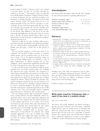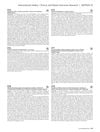 7 citations,
June 2019 in “Cureus”
7 citations,
June 2019 in “Cureus” Fractional lasers and microneedling, combined with topical agents, could potentially treat Alopecia Areata effectively, but more research is needed due to limited data.
 55 citations,
July 2016 in “Dermatologic Therapy”
55 citations,
July 2016 in “Dermatologic Therapy” Multiple treatments work best for hair loss.
 50 citations,
December 1998 in “Dermatologic Surgery”
50 citations,
December 1998 in “Dermatologic Surgery” Hair loss is more common in men aged 18-49 and increases with age.
 7 citations,
January 2010 in “Pharmacognosy Research”
7 citations,
January 2010 in “Pharmacognosy Research” The tobacco leaf extract may help hair grow and could treat hair loss.
 74 citations,
January 1998 in “Dermatology”
74 citations,
January 1998 in “Dermatology” Men who think they are losing hair feel worse about themselves, especially if they are younger.
January 2023 in “International Journal of Trichology” Low-level laser therapy is safe but not significantly better than minoxidil alone for hair growth.
1 citations,
August 2005 in “Springer eBooks” Alopecia areata is an autoimmune disease with genetic links, treatable with certain medications, and can affect mental health.
23 citations,
October 2020 in “Anais brasileiros de dermatologia/Anais Brasileiros de Dermatologia” Tailored treatments for alopecia areata are recommended based on severity and patient needs.
1 citations,
May 2019 in “International Journal of Applied Pharmaceutics” Both hair tonic and gel with Angiopteris evecta extract effectively stimulate hair growth.
August 2024 in “Journal of Clinical Medicine” Low-level laser therapy is the most supported treatment for hair loss, but other methods show promise.
 January 2023 in “Journal of Cosmetics, Dermatological Sciences and Applications”
January 2023 in “Journal of Cosmetics, Dermatological Sciences and Applications” The hair growth serum Trichosera® was effective in increasing hair regrowth and density and reducing hair fall without significant side effects.
 8 citations,
April 2015 in “British Journal of Dermatology”
8 citations,
April 2015 in “British Journal of Dermatology” White piedra, a rare fungal infection, was diagnosed in two women in a northern climate.
 70 citations,
February 2015 in “Expert Opinion on Drug Discovery”
70 citations,
February 2015 in “Expert Opinion on Drug Discovery” Topical drugs and near-infrared light therapy show potential for treating alopecia.
 5 citations,
January 2021 in “Journal of Cosmetic Dermatology”
5 citations,
January 2021 in “Journal of Cosmetic Dermatology” Topical cetirizine 1% promotes hair growth in male androgenetic alopecia patients.
 5 citations,
March 2017 in “Journal of Dermatology”
5 citations,
March 2017 in “Journal of Dermatology” Patients and doctors find current hair loss treatments unsatisfying and believe involving patients in decisions improves results.
 46 citations,
June 2015 in “Fertility and Sterility”
46 citations,
June 2015 in “Fertility and Sterility” Insulin resistance is significantly linked to a higher risk of depression in women with PCOS.
 44 citations,
July 2011 in “Dermatologic Therapy”
44 citations,
July 2011 in “Dermatologic Therapy” Finasteride effectively increases hair growth in men with AGA, works better for those over 30, and may cause some side effects.
 3 citations,
June 2004 in “Alternative and Complementary Therapies”
3 citations,
June 2004 in “Alternative and Complementary Therapies” The document concludes that hair loss is influenced by genetics and other factors, and while treatments like finasteride can help, they have limitations and side effects.
 1 citations,
April 2019 in “Journal of Investigative Dermatology”
1 citations,
April 2019 in “Journal of Investigative Dermatology” Patients with autoimmune blistering diseases experience a reduced quality of life, with the need for better measurement tools, especially for those with mucous membrane pemphigoid.

Finasteride is a safe and effective long-term treatment for male hair loss, especially when started early.
3 citations,
November 2021 in “Clinical, Cosmetic and Investigational Dermatology” Autologous cellular micrografts improve hair density and thickness in the short term for androgenetic alopecia.
19 citations,
January 1990 in “Springer eBooks”  7 citations,
January 2022 in “Scientific Reports”
7 citations,
January 2022 in “Scientific Reports” Acanthus ebracteatus Vahl. extract and verbascoside may help prevent hair loss and promote hair growth due to their anti-inflammatory properties and ability to protect against cell death.
 October 2024 in “Biology”
October 2024 in “Biology” Dermal papilla cells can help regrow hair and are promising for hair loss treatments.
 August 2024 in “International Journal of Molecular Sciences”
August 2024 in “International Journal of Molecular Sciences” Androgenetic alopecia involves immune cell disruptions, especially increased CD4+ T cells around hair follicles.
 December 2023 in “Journal of Cosmetic Dermatology”
December 2023 in “Journal of Cosmetic Dermatology” The hair growth product was effective and safe, increasing hair growth, thickness, and density while reducing hair fall.
 August 2023 in “Stem Cell Research & Therapy”
August 2023 in “Stem Cell Research & Therapy” A substance called Cell-free fat extract can effectively treat common hair loss by increasing hair growth and density.
15 citations,
December 2009 in “American journal of clinical dermatology” The effectiveness of alternative treatments for alopecia areata is uncertain and needs more research.
 3 citations,
June 2023 in “Medicines”
3 citations,
June 2023 in “Medicines” Some antiseizure medications can cause reversible hair loss, with valproate, lamotrigine, and carbamazepine being the most common.

Different genes cause Female Pattern Hair Loss compared to male hair loss, and treatments vary, but more research is needed to understand it fully.





















